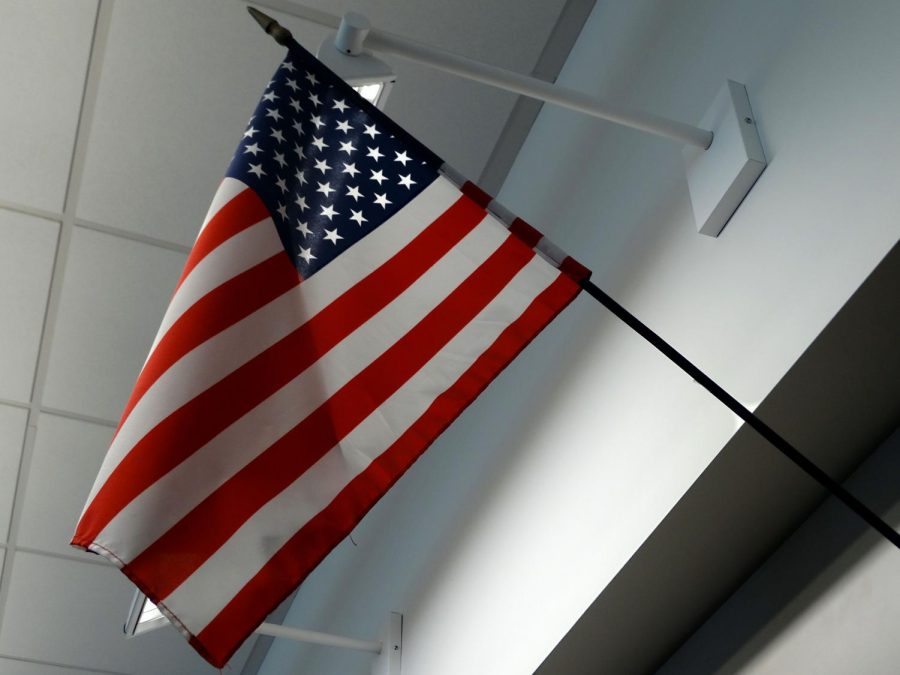I Pledge Allegiance to the Flag
October 11, 2021
If you live in America, you have heard the Pledge of Allegiance, said the Pledge of Allegiance, and maybe even have recognized it in a movie. The Pledge of Allegiance is important in the United States and it is universally known by heart, whether you want to know it or not. From the time they begin kindergarten, children usually learn the Pledge of Allegiance there, and then, recite it every day throughout their education at the start of each school day.
The Pledge of Allegiance is spoken standing up, looking towards the flag of the United States, with your right arm over your heart. Over the years there have become many variations of how people recite the pledge. Variations including standing and not reciting it to standing and reciting it with no hand over your heart, to sitting down and not acknowledging the flag. Schools in the United States have started to see more and more students not reciting the Pledge. Reasons may vary for students choosing to not stand for the flag. Sophomore Danielle Bone says, “I usually stand out of respect. I think maybe people who do not stand may have differing opinions on how the country is run or maybe people don’t agree with certain things.” Bone is right. Many people do believe that America is flawed or there is injustice occurring. This thought process leads people to think: Why should I stand up for something I am not proud of or feeling supportive of? This is a position many Americans are in regarding the Pledge of Allegiance. Still there are many differing opinions as to why people do not stand for the pledge. Senior Audrey Anderson offers her thoughts to why people do not feel compelled to stand: “I think people sit sometimes to not necessarily protest but because they don’t feel like it or don’t think it’s necessary or already feel that they have expressed their allegiance to the United States and that they don’t feel it’s necessary to do it every single day.”
On the other hand, many students and staff do recite the Pledge. Reasons for reciting the Pledge also vary. Anderson says, “I stand with my right hand over my heart facing the flag. I do this because we stand to respect the country and salute the flag while saying the Pledge. I think we say the pledge to express our allegiance and respect our soldiers and all the people that have died for us in the United States.” Respect is a common reason people stand. People also seem to feel compelled to stand because it can be seen as a social norm in American schools. Language arts teacher Alyssa Giesler says, “I usually stand. I think people choose to stand because they believe in the sense of freedom and unifying ideal of the American flag so they stand to honor that and to honor the soldiers and men and women who have fought to defend that flag.” Anderson and Giesler have similar thoughts on why people stand for the pledge. The “original reason behind children saying the Pledge was to instill a sense of patriotism for their country.” The pledge has many different interpretations such as respect, patriotism and social norms that are all common reasons why people recite the pledge.
The Pledge of Allegiance has not always been the same since the original came out in 1892. It has had a few word changes over time. The words in the Pledge seem to also give effect to why some people say it or not. One line in particular students say is probably why some students do not say the Pledge is “under God.”Anderson says, “Some people aren’t religious or believe in the separation of church and state and I think that people might choose not to say those words if they have a different religion or that does not pertain to them or they’re not religious.” Similarly, freshman Audrey Beaver thinks, “Atheists and people who don’t believe in one God but God’s plurally, that’s strange for them and not something they believe in.” Collectively, it is apparent that students who maybe do not identify with Christianity or a religion portaining a God may feel out of place. “In fact, the controversial phrase “under God” was not always part of the Pledge of Allegiance It was added by law on June 14, 1954.” George Docherty, who was a former pastor to the New York Avenue Presbyterian Church felt compelled to “‘omit the words ‘under God’ in the Pledge of Allegiance is to omit the definitive factor in the American way of life,” Docherty said from the pulpit. He felt that “under God” was broad enough to include Jews and Muslims, although he discounted atheists.”Although many of the people sitting during the pledge do it because of differing religious beliefs, there are still various reasons people sit.
Due to the increase of people not standing during the pledge this has made for more people critiquing what others choose to do. Junior Avni Doshi believes standing or sitting is a “personal choice. I’m not going to judge people either way.” History of Sports teacher Zachary Myers says, “I am indifferent to what students choose to do during the pledge as long as they are respectful of each other. I believe that people should have the right to choose whether they participate or not.” It is a common agreement among some students and staff that what people do during the pledge whether it be sit or stand is their right and personal choice. It is also helpful when either sitting or standing to have mutual respect for one another and be thoughtful that there are many opinions on what is right. Some people believe that you have to stand for the pledge no matter what, yet that is false and has been a battle already fought. For instance, “In its 1943 decision West Virginia Board of Education v. Barnette, the U.S. Supreme Court determined that the First Amendment protects a student’s right not to engage in certain speech. The First Amendment generally prohibits the government from punishing people for engaging in certain speech. In Barnette, the high court extended the reach of the First Amendment to also prohibit the government from compelling speech.” Therefore all people have the personal choice to stand or sit.
Overall, the Pledge of Allegiance in school can be an uncomfortable subject for people because of the varying disagreements, opinions, and beliefs among students and staff who come into contact with the pledge daily. There can be peace within this topic when people come to agreement to be respectful to all peoples choices regarding the pledge.





Aunt Penny • Jan 24, 2022 at 4:25 pm
I love this! You’re so creative and intuitive!
You’re an amazing writer!!